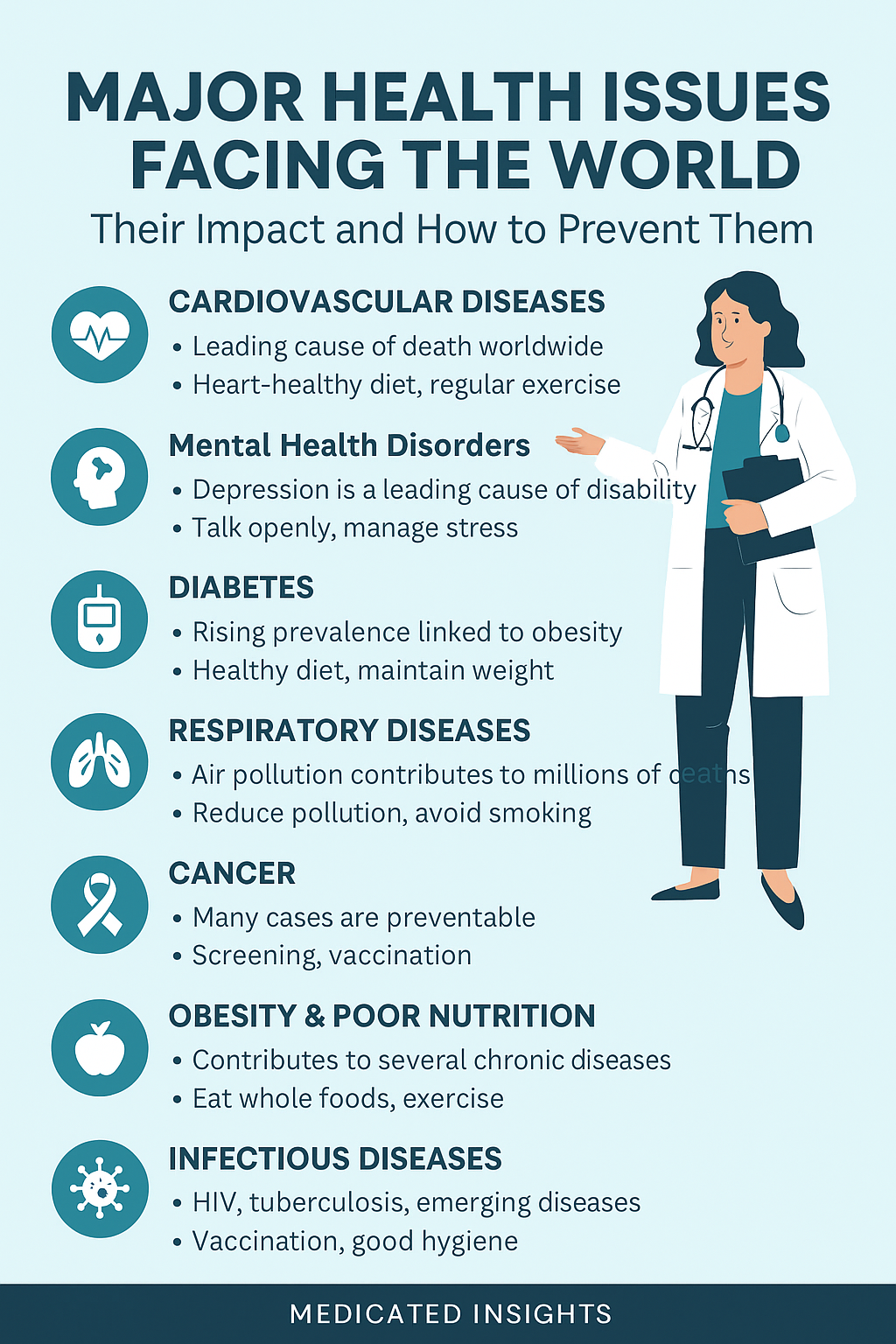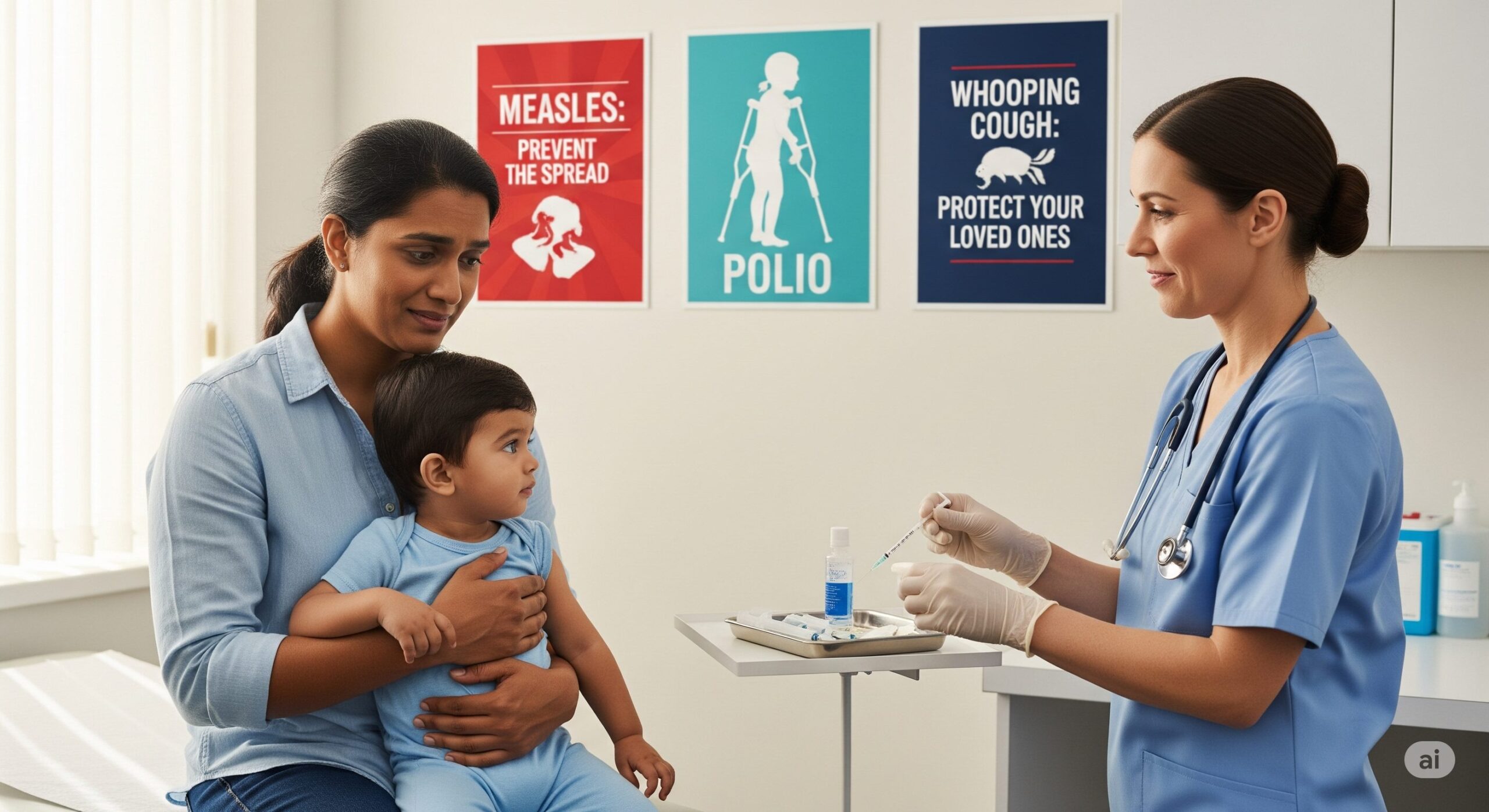In the 21st century, global health challenges are no longer limited to infectious diseases or malnutrition. As our societies grow more connected and complex, new health risks emerge while older ones evolve. The world faces a mix of communicable and non-communicable diseases, mental health crises, and lifestyle-related illnesses that impact millions of lives every year.
In this blog, we’ll explore the major health issues currently affecting the global population, their impact on individuals and societies, and the most effective strategies to prevent them.
1. Cardiovascular Diseases (CVDs)
🌍 Global Impact:
According to the World Health Organization (WHO), cardiovascular diseases are the number one cause of death globally, accounting for nearly 18 million deaths annually. CVDs include conditions like heart attacks, stroke, and hypertension.
🔥 Why It Matters:
-
Affects people across all income levels
-
Often develops silently over years
-
Increases healthcare costs for families and governments
✅ Prevention:
-
Adopt a heart-healthy diet (low salt, low saturated fat, more fruits and vegetables)
-
Engage in at least 150 minutes of moderate physical activity per week
-
Quit smoking and limit alcohol intake
-
Monitor blood pressure and cholesterol regularly
-
Manage stress effectively
2. Mental Health Disorders
🌍 Global Impact:
Over 970 million people worldwide suffer from some form of mental health disorder, including depression, anxiety, and bipolar disorder. The COVID-19 pandemic has significantly worsened mental health across all age groups.
🔥 Why It Matters:
-
Depression is a leading cause of disability globally
-
Mental health disorders can trigger physical illness, substance abuse, and suicide
-
Many people suffer in silence due to stigma and lack of access to care
✅ Prevention:
-
Encourage open dialogue about mental health
-
Promote early intervention through education and awareness
-
Engage in daily mindfulness, meditation, or breathing exercises
-
Build strong social connections and support systems
-
Seek professional help when signs of mental illness appear
3. Diabetes (Type 2 Diabetes in Particular)
🌍 Global Impact:
An estimated 537 million adults live with diabetes. This number is expected to rise to 783 million by 2045. The vast majority have Type 2 diabetes, which is strongly linked to diet and lifestyle.
🔥 Why It Matters:
-
Leads to heart disease, kidney failure, blindness, and amputations
-
Significant economic burden on families and health systems
-
Often preventable but rarely reversed without long-term effort
✅ Prevention:
-
Maintain a healthy weight
-
Cut down on processed sugar and refined carbohydrates
-
Stay active — even walking 30 minutes a day helps
-
Get regular health checkups, especially if there’s a family history
-
Avoid sugary drinks and monitor blood sugar if you’re at risk
4. Respiratory Diseases (e.g., COPD, Asthma, Pollution-related Illnesses)
🌍 Global Impact:
Chronic respiratory diseases like Chronic Obstructive Pulmonary Disease (COPD) and asthma affect over 500 million people globally. Air pollution alone is responsible for more than 4 million premature deaths annually.
🔥 Why It Matters:
-
Often underdiagnosed and poorly managed
-
Affects quality of life, especially in urban and industrial regions
-
Children and elderly are especially vulnerable
✅ Prevention:
-
Reduce indoor and outdoor air pollution exposure
-
Quit smoking and avoid secondhand smoke
-
Use protective gear in industrial workplaces
-
Manage asthma and allergies with medical guidance
-
Support clean energy and climate protection policies
5. Cancer
🌍 Global Impact:
Cancer is a leading cause of death worldwide, with around 10 million deaths annually. The most common types include lung, breast, colorectal, and prostate cancer.
🔥 Why It Matters:
-
Many cancers are preventable or treatable if detected early
-
Lifestyle and environmental factors play a large role
-
Cancer care is expensive and emotionally devastating for families
✅ Prevention:
-
Get regular screenings (mammograms, colonoscopies, Pap tests)
-
Avoid tobacco and excessive alcohol use
-
Maintain a healthy diet and active lifestyle
-
Get vaccinated (e.g., HPV vaccine for cervical cancer)
-
Protect yourself from harmful UV rays and environmental toxins
6. Obesity and Poor Nutrition
🌍 Global Impact:
Globally, over 1.9 billion adults are overweight, and more than 650 million are obese. Childhood obesity is also rising at alarming rates.
🔥 Why It Matters:
-
Increases risk of heart disease, diabetes, cancer, and joint issues
-
Poor nutrition impairs immunity and productivity
-
Leads to long-term health issues starting from a young age
✅ Prevention:
-
Focus on a balanced diet rich in whole foods
-
Avoid sugary drinks and processed snacks
-
Encourage physical activity in schools and communities
-
Limit screen time and promote outdoor play for children
-
Provide nutrition education at all levels of society
7. Infectious Diseases (Old and New)
🌍 Global Impact:
While much progress has been made, diseases like HIV/AIDS, tuberculosis, malaria, and newly emerging viruses (like COVID-19) remain global threats.
🔥 Why It Matters:
-
Pandemics have shown the world how fast diseases spread
-
Millions in low-income countries still die from preventable infections
-
Antibiotic resistance is on the rise, making treatment harder
✅ Prevention:
-
Ensure access to clean water, sanitation, and hygiene
-
Get vaccinated and promote immunization in your community
-
Educate on safe sex and needle hygiene practices
-
Invest in global disease surveillance and research
-
Use antibiotics responsibly to prevent resistance
Final Thoughts: A Global Call for Prevention
The major health issues facing the world today are preventable or manageable with the right actions. While medical technology continues to advance, the real key to reducing illness and premature death lies in awareness, education, and lifestyle change.
Preventing these issues doesn’t require extreme diets or expensive treatments. It starts with:
-
Small, consistent healthy habits
-
Public health policies that support clean environments and access to care
-
Community-level support systems for mental and physical health
Your health is your greatest asset.
Whether you’re an individual or part of a global health initiative, prevention is always better than cure.
🌍 Let’s build a healthier world—together.






One thought on “Major Health Issues Facing the World Today — Their Impact and How to Prevent Them”